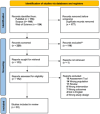Integrating non-technical skills into undergraduate medical simulation: a scoping review and thematic analysis of current practices
- PMID: 41121410
- PMCID: PMC12542256
- DOI: 10.1186/s41077-025-00377-9
Integrating non-technical skills into undergraduate medical simulation: a scoping review and thematic analysis of current practices
Abstract
Background: Non-technical skills (NTS) play a crucial role in reducing patient harm. In light of this, medical schools are now integrating NTS into their undergraduate curricula to encourage efficiency and reduce human errors, particularly during highly stressful scenarios. Utilising medical simulations has become prevalent for honing these skills in a controlled environment. However, a lack of guidance on how best to design and deliver effective NTS training leads to inconsistencies in quality and outcomes. Therefore, this review aims to examine current practices in simulation-based NTS training for medical students to collate evidence-informed strategies for enhancing its effectiveness.
Methods: A scoping review was carried out according to PRISMA-ScR guidelines. A search strategy was performed on PubMed, Scopus and Web of Science databases from inception to 17th June 2025. A thematic analysis of eligible studies identified recurring themes, leading to a conceptual model for the current delivery of NTS training.
Results: The screening process yielded 51 articles and commonly occurring themes were synthesised: Simulation setup, simulation modality, post-simulation activity, observational tools for NTS and learning environment. We identified several key practice points that are essential for the successful implementation of NTS training. These include pre-simulation briefings, appropriate fidelity, and debriefing sessions which collectively form the foundation for effective training outcomes.
Conclusion: The resulting themes highlight the effective strategies currently employed for NTS training in undergraduate medical simulation. Educators will be able to use these to design and implement consistent, effective NTS training.
Keywords: Human factors; Medical student; Non-technical skills; Patient safety; Undergraduate medical simulation.
© 2025. The Author(s).
Conflict of interest statement
Declarations. Competing interests: The authors declare no competing interests.
References
-
- Institute of Medicine (US). To Err Is Human. 2000 ed. United States: National Academies Press (US); 2000.
-
- Lynch A. Simulation-based acquisition of non-technical skills to improve patient safety. Sem Pediatr Surg. 2020;29:150906. - PubMed
-
- Moll-Khosrawi P, Küllmei J, Zöllner C, Schulte-Uentrop L. Efficacy of an integrated simulation-based education approach to train non-technical skills in medical undergraduate students. Educ Sci. 2023;13.
LinkOut - more resources
Full Text Sources


